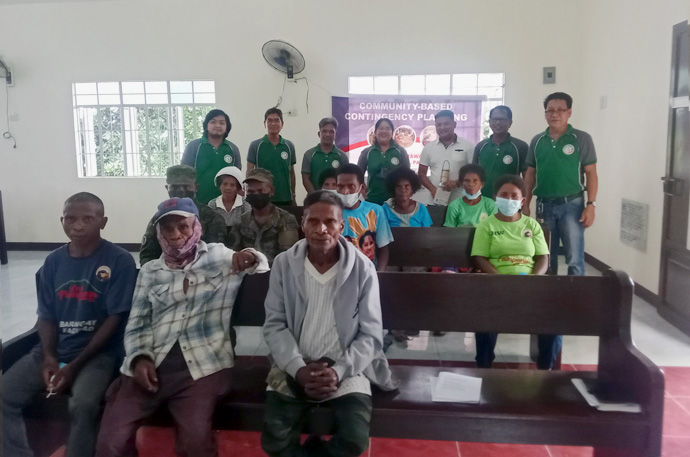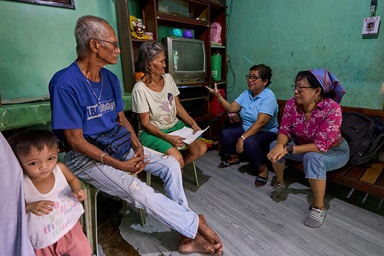
Key Points:
- Through Community-based Contingency Planning, the church in the Philippines is working with Indigenous peoples to prepare for disaster and address climate change.
- “Engaging with the Aeta community … gave us compelling experience and real-world perspective on indigenous resilience during disasters,” said Phine M. Cedillo, Manila Area disaster-management coordinator. “We learn from their stories, practices and experiences.”
- Romuel S. Flores noted that women in indigenous communities play significant roles in preparedness and recovery.
Before world economic leaders involved Indigenous peoples on the front lines to address climate change, Filipino United Methodists were working alongside the Aetas in Mawacat, a barangay — district — in Florida Blanca, Pampanga.
“Engaging with the Aeta community … gave us compelling experience and real-world perspective on indigenous resilience during disasters,” said Phine M. Cedillo, Manila Area disaster-management coordinator. “We learn from their stories, practices and experiences.”
Cedillo said the Aetas’ rich culture and traditional knowledge and practices enable them to adapt and manage changes around them.
“I was amazed that these traditions and old practices kept them self-sufficient and steadfast,” she said, “despite the constant changes, not to mention the lack of social services.”
However, without continued support for building capacity and awareness, Cedillo added, their resiliency is “threatened with multi-hazard vulnerabilities.”
She encouraged more in-depth information to strengthen their competence while considering the preservation of their traditions and respecting their rights.
Community-based Contingency Planning was adopted by all episcopal areas of the Philippines Central Conference in 2018. The outreach has shown the role Indigenous practices can play in addressing climate issues.

The Jan. 16-20 World Economic Forum in Davos, Switzerland, involved more than 3,000 government and business leaders who acknowledged that Indigenous knowledge and lands are key elements in a global climate-change strategy.
The executive summary of the forum’s report stated that respecting Indigenous peoples’ cultural knowledge, rights and responsibilities would boost the resilience and long-term impact of landscape conservation and restoration projects.
The Rev. Willie Tolentino, the disaster risk reduction chair of the Pampanga Philippines Conference, noted the challenges of reaching the Aeta community. One must travel for an hour, crossing two rivers without bridges.
“I believe that this tool, Community-based Contingency Planning, will help them prepare, prevent the risk and danger from different hazards, and (develop) a clear plan for their safety in times of tragedies,” Tolentino said.
“Because of its geographical location (highlands),” he explained, “the community is prone to typhoons, landslides, earthquakes and even drought in the summer because they only rely on water coming from mountains. During the rainy season, the community is isolated.”
Tolentino said that immersing with the community has provided more evidence of government neglect.
Cedillo said the conference identified the Aeta community as high risk and in need of priority. Another contingency-planning process with an Indigenous community in Barangay Dibut in Aurora followed.
“The culture of our Indigenous people,” said Manila Area Bishop Ruby-Nell M. Estrella, “reveals a holistic way of dealing with the challenges of life in their communities. Caring for and protecting their ancestral land is at the core of their being. We have much to learn from them.”
Subscribe to our
e-newsletter
She said the episcopal area will continue to work with Indigenous communities and share their ways of addressing climate change.
“These inspiring stories must be told, so these practices will be replicated in other communities.”
Davao Area Bishop Israel M. Painit agreed.
“Their understandings, skills and philosophies, developed by societies with long histories of interaction with their natural surroundings, are imperative and of great value. For rural and Indigenous peoples, local knowledge informs decision-making about fundamental aspects of day-to-day life.”
He said that the Davao Area has more than 10 ethnic groups with best practices for helping climate issues.
“We need to highlight them in our programs as an integral part of providing a foundation for locally appropriate sustainable development,” Painit said. “It’s our way of encouraging our constituents to revisit our rich tradition of addressing the climate crisis.”
Cedillo noted that the government has opportunities to learn from Indigenous communities, noting that science-based assessments don’t have to discount the proven knowledge and practices of Indigenous peoples. “They complement each other,” she said.
“If the government starts to take them seriously by providing them with basic services and being immersed in IP communities, they have much more to learn than to lose.”
Baguio Area Bishop Rodel M. Acdal believes that Indigenous communities are at the forefront of environmental conservation and, therefore, a strong force in addressing the climate crisis.
“There are many Indigenous communities in the Baguio Episcopal Area,” he said. “As their bishop, my responsibility is to look for their welfare. Part of it is to showcase their traditions, culture and practices, especially on environmental preservation.
“It is imperative that we protect, preserve and promote the traditional knowledge, sustainable practices and skills of Indigenous communities to mitigate the damage. We must recognize that the cultural heritage and traditional knowledge of Indigenous peoples and local communities can contribute significantly to conservation and strengthen responses to climate change.
“My office will ensure that their programs and ministries will be funded,” he added.
Romuel S. Flores recalled experiences of immersing in Indigenous communities in Cordillera and Mindanao. He is an independent consultant for international disaster response for the United Methodist Committee on Relief.
He noted that women in these communities play significant roles in preparedness and recovery.
“It has validated that women are on the front lines,” he said.
Flores urged The United Methodist Church globally and locally to invest in disaster risk reduction, preparedness and mitigation and resilience in high-risk communities.
“Raise a strong voice to call for climate justice and actions.”
He described Community-based Contingency Planning with Indigenous peoples as empowering.
“We learned a lot from them, especially women asserting their first-responder rights and pride.”
Cedillo said Indigenous peoples continue to be good stewards of God's creation.
“Indigenous knowledge and practices of nurturing nature that nurtures us bring us closer to God.
“They are inspiring as they share their stories with dignity and resilience. Engaging with them opens many opportunities to learn, grow, serve, love and be more for the glory of God.”
Mangiduyos is a UM News correspondent in the Philippines.
News media contact: Julie Dwyer, news editor, [email protected] or 615-742-5469. To read more United Methodist News, subscribe to Free Daily or Weekly Digests.



